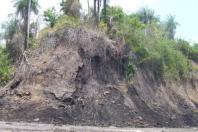Fight erupts over uintah basin (Utah) oil shale mining project, protection of water
Fight erupts over uintah basin oil shale mining project, protection of water
SALT LAKE CITY — Sharp disagreement over the threat oil shale mining poses to water resources in the Book Cliffs area has now erupted into a legal donnybrook between conservation groups and state water quality regulators.
On one hand, groups such as the Sierra Club that oppose the state-issued groundwater discharge permit say it does not offer sufficient protections for surface or groundwater.
In reply, the state said extensive hydrological testing reveals the project area is so arid and lacks any year-round flowing streams that there are no water resources at risk.
The disagreement prompted the groups to file a request for action Tuesday in challenge to the permit, generating a second look before the project by Red Leaf Resources goes forward.
“The scheme used by Red Leaf Resources is basically the same as it was for failed ventures a century ago: Mine it, crush it, sort it, put it in an oven, heat it, gather the liquid into a sump, hope that it doesn’t burn the facility down, and get it to a refinery before it congeals,” said John Weisheit, conservation director with Living Rivers. “It makes far more sense for an energy company to come over to my house and install solar panels on my roof.”
Jeff Hartley, Red Leaf's spokesman, said the objection by the environmental groups is less about water and more about energy philosophy.
"My response to criticism of oil shale is that either you hate carbon-based energies or you don’t. And if you hate carbon-based energy sources, you will never like oil shale," he said. "And if you realize that oil, gas and coal are part of our energy portfolio, you have to embrace oil shale, that it will be successful, and that is what Red Leaf will prove out."
Hartley said the permit was obtained as a precautionary measure and as a procedural way to help the operation withstand the scrutiny leveled by opponents.
"The operation does not use water to extract, and there is no discharge of water by the operation," he said. "Beyond that, there is no aquifer out there to be impacted."
Hartley said the goal is for Red Leaf to be producing 300,000 barrels of oil by the end of 2015 — representing the world's first commercial production of oil shale in decades.
"It will prove on a large scale that the technology works as designed," he said.
Red Leaf holds leases to 17,000 acres of Utah School and Institutional Trust Lands, with a 2009 pilot project that was able to produce more than 300 barrels of oil.
In this next phase, the company will use a 6-acre area involving a clay- and gravel-lined pit that is 200 feet deep, where the shale will be heated at 725 degrees to extract the oil.
The groups say the process exposes the environment to a host of contaminants.
"It's clearly a misguided state energy policy that encourages heating rocks to find usable oil, especially after a century of similar ventures have failed," said Tim Wagner of the Sierra Club in Salt Lake City. "It's this lack of visionary leadership that is putting Utah far behind the curve of other Western states that are embracing the clean energy revolution of the 21st century."
Attorney Rob Dubuc of Western Resource Advocates is representing Living Rivers, Grand Canyon Trust, Southern Utah Wilderness Alliance, Great Old Broads for Wilderness, and the Sierra Club in the challenge.
The groups have also opposed the permit issued to U.S. Oil Sands for its operation to extract bitumen from Utah's oil sands resources. That case is pending before the Utah Supreme Court.
Email: amyjoi@deseretnews.com
http://www.deseretnews.com/article/865594657/Fight-erupts-over-Book-Cliffs-oil-shale-mining-project-protection-of-water.html


